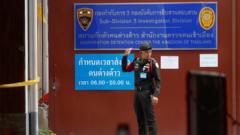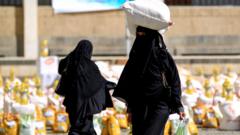The UN's suspension of humanitarian work comes after the detention of 24 staff members since 2021, with serious implications for Yemen's humanitarian crisis.
U.N. Halts Humanitarian Operations in Northern Yemen Amid Staff Detentions

U.N. Halts Humanitarian Operations in Northern Yemen Amid Staff Detentions
UN suspends aid efforts due to ongoing arrests by Houthi forces in Yemen, impacting vital services for millions.
The United Nations has announced a significant suspension of its humanitarian operations in northern Yemen, an area heavily controlled by the Iran-backed Houthi movement, following the recent detention of its staff members. This decision, taken by UN Secretary-General António Guterres, stems from the arrest of eight additional workers in late January, which has raised the total number of detained personnel to 24 since 2021, according to UN spokesman Farhan Haq.
The U.N. cited the hostile conditions created by these arbitrary detentions, which violate a December agreement aimed at safeguarding the staff and ensuring their release. The Houthis’ actions have been framed around vague allegations of espionage and foreign interference. The U.N. has described the suspension as an "extraordinary and temporary measure," indicating a need to balance the imperative of providing aid with the necessity of ensuring the safety and security of its personnel.
In light of these detentions, the U.N. has also halted all travel for its staff within Houthi-controlled regions, further impacting the organization’s ability to deliver critical assistance. The Houthis, who hold significant power in Yemen, have conducted a systematic campaign of kidnappings against UN and NGO workers, alongside various former employees of the U.S. government.
Yemen is currently facing what the U.N. classifies as the largest humanitarian crisis worldwide, with around 80 percent of its population—approximately 24.1 million people—requiring essential aid. The recent suspension of U.N. operations is expected to exacerbate the already dire situation, with many relying on U.N. services for food, clean water, and medical kits. The scale of the humanitarian impacts due to this suspension remains unclear, but it underscores the ongoing challenges faced by humanitarian agencies in conflict-affected areas.
The U.N. cited the hostile conditions created by these arbitrary detentions, which violate a December agreement aimed at safeguarding the staff and ensuring their release. The Houthis’ actions have been framed around vague allegations of espionage and foreign interference. The U.N. has described the suspension as an "extraordinary and temporary measure," indicating a need to balance the imperative of providing aid with the necessity of ensuring the safety and security of its personnel.
In light of these detentions, the U.N. has also halted all travel for its staff within Houthi-controlled regions, further impacting the organization’s ability to deliver critical assistance. The Houthis, who hold significant power in Yemen, have conducted a systematic campaign of kidnappings against UN and NGO workers, alongside various former employees of the U.S. government.
Yemen is currently facing what the U.N. classifies as the largest humanitarian crisis worldwide, with around 80 percent of its population—approximately 24.1 million people—requiring essential aid. The recent suspension of U.N. operations is expected to exacerbate the already dire situation, with many relying on U.N. services for food, clean water, and medical kits. The scale of the humanitarian impacts due to this suspension remains unclear, but it underscores the ongoing challenges faced by humanitarian agencies in conflict-affected areas.



















